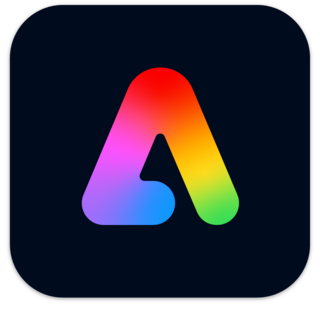
Digital art refers to any artistic work or practice that uses digital technology as part of the creative or presentation process. It can also refer to computational art that uses and engages with digital media. Since the 1960s, various names have been used to describe digital art, including computer art, electronic art, multimedia art, and new media art.

Image sharing, or photo sharing, is the publishing or transfer of digital photos online. Image sharing websites offer services such as uploading, hosting, managing and sharing of photos. This function is provided through both websites and applications that facilitate the upload and display of images. The term can also be loosely applied to the use of online photo galleries that are set up and managed by individual users, including photoblogs. Sharing means that other users can view but not necessarily download images, and users can select different copyright options for their images.
Social network advertising, also known as social media targeting, is a group of terms used to describe forms of online advertising and digital marketing that focus on social networking services. A significant aspect of this type of advertising is that advertisers can take advantage of users' demographic information, psychographics, and other data points to target their ads.
Zhang Jingna is a China-born Singaporean photographer widely known as "zemotion." Her works have appeared on multiple editions of Vogue, Elle and Harper's Bazaar. She was named on the Forbes 30 Under 30 Asia list 2018. Zhang founded the art platform Cara in 2023.

Instagram is an American photo and video sharing social networking service owned by Meta Platforms. It allows users to upload media that can be edited with filters, be organized by hashtags, and be associated with a location via geographical tagging. Posts can be shared publicly or with preapproved followers. Users can browse other users' content by tags and locations, view trending content, like photos, and follow other users to add their content to a personal feed. A Meta-operated image-centric social media platform, it is available on iOS, Android, Windows 10, and the web. Users can take photos and edit them using built-in filters and other tools, then share them on other social media platforms like Facebook. It supports 32 languages including English, Hindi, Spanish, French, Korean, and Japanese.

DIY is an online skill-building platform designed specifically for children. Its website houses a variety of multi-media content designed to teach children various skills, in the context of a global interest-based community. On the COPPA certified platform, each user has their personal profile and is allowed to share creations and accomplishments with friends. The skills learned on DIY are largely creative and maker-focused. Recently DIY closed down but has seemed to make a slight appearance. A quote from a mentor states, “This is just a test we hope our DIYers don’t get there hopes up.” DIY closed down 4 months ago due to “Google policies”
Picsart is an Armenian-American technology company based in Miami, Florida, United States and Yerevan, Armenia that develops the Picsart suite of online photo and video editing applications, with a social creative community. The platform allows users to take and edit pictures and videos, draw with layers, and share the images on Picsart and other social networks. It is one of the world's most popular apps, with reportedly more than 1 billion downloads across 180 countries.

Xiaohongshu, also known as RED, REDnote, or more commonly as XHS, is a social media and e-commerce platform. In the Xiaohongshu community, information is presented in a Pinterest-style layout, but combined with video and live streaming features, and users can also share product reviews and text descriptions of travel destinations. It has been described as "China's answer to Instagram", and simply as "Chinese Instagram".

Vero is a social media platform and mobile app company. Vero markets itself as a social network free from advertisements, data mining and algorithms.

Meta Platforms, Inc., doing business as Meta, and formerly named Facebook, Inc., and TheFacebook, Inc., is an American multinational technology conglomerate based in Menlo Park, California. The company owns and operates Facebook, Instagram, Threads, and WhatsApp, among other products and services. Advertising accounts for 97.8 percent of its revenue. Originally known as the parent company of the Facebook service, as Facebook, Inc., it was rebranded to its current name in 2021 to "reflect its focus on building the metaverse", an integrated environment linking the company's products and services.
Deepfake pornography, or simply fake pornography, is a type of synthetic pornography that is created via altering already-existing photographs or video by applying deepfake technology to the images of the participants. The use of deepfake porn has sparked controversy because it involves the making and sharing of realistic videos featuring non-consenting individuals, typically female celebrities, and is sometimes used for revenge porn. Efforts are being made to combat these ethical concerns through legislation and technology-based solutions.

Bluesky is a microblogging social media service. Similar to Twitter, users can share short text messages, images, and videos in short posts colloquially known as "skeets". It is owned by Bluesky Social PBC, a public benefit corporation based in the United States.

Meta AI is a company owned by Meta that develops artificial intelligence and augmented and artificial reality technologies. Meta AI deems itself an academic research laboratory, focused on generating knowledge for the AI community, and should not be confused with Meta's Applied Machine Learning (AML) team, which focuses on the practical applications of its products.

A text-to-video model is a machine learning model that uses a natural language description as input to produce a video relevant to the input text. Advancements during the 2020s in the generation of high-quality, text-conditioned videos have largely been driven by the development of video diffusion models.

Filters are digital image effects often used on social media. They initially simulated the effects of camera filters, and they have since developed with facial recognition technology and computer-generated augmented reality. Social media filters—especially beauty filters—are often used to alter the appearance of selfies taken on smartphones or other similar devices. While filters are commonly associated with beauty enhancement and feature alterations, there is a wide range of filters that have different functions. From adjusting photo tones to using face animations and interactive elements, users have access to a range of tools. These filters allow users to enhance photos and allow room for creative expression and fun interactions with digital content.
Prisma Labs is a software company based in Sunnyvale, California that is known for developing Prisma and Lensa.

Threads is a social media, microblogging service operated by Meta Platforms. Threads requires an Instagram account to use the service and features integration between the two platforms. Upon its launch, Threads became the fastest-growing consumer software application in history, gaining over 100 million users in its first five days and surpassing the record previously set by ChatGPT.

Adobe Express, formerly Adobe Spark and later Creative Cloud Express, is a content creation tool developed by Adobe. It is a cloud-based design platform where users can create videos, PDF documents, web pages, graphics and other digital assets. It is aimed at mainstream users, not professional graphic designers.
Unfold is a mobile application that allows users to create social media content using a variety of templates and other tools. It was founded in 2018 by Alfonso Cobo and Andy McCune. It enables users to add photos, video, and text with a variety of tools. In 2019, Unfold was acquired by Squarespace.














